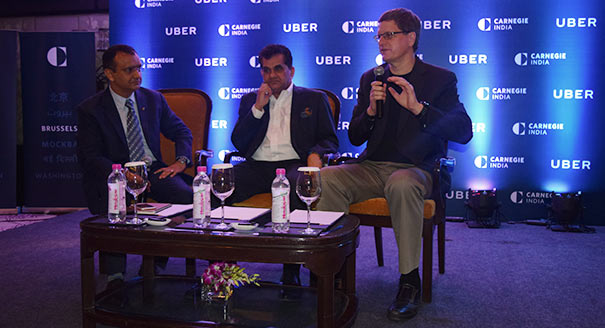{
"authors": [
"Brian McClendon",
"Amitabh Kant",
"Shivnath Thukral"
],
"type": "event",
"centerAffiliationAll": "",
"centers": [
"Carnegie Endowment for International Peace",
"Carnegie India"
],
"collections": [],
"englishNewsletterAll": "",
"nonEnglishNewsletterAll": "",
"primaryCenter": "Carnegie India",
"programAffiliation": "",
"programs": [],
"projects": [
"Technology and Society"
],
"regions": [
"South Asia",
"India"
],
"topics": [
"Technology"
]
}
Mapping and Mobility: In Conversation With Uber
Tue, June 28th, 2016
New Delhi
Technology’s immense potential to transform user mobility is directly correlated with the seamless integration of map data and tracking capabilities. While digital maps have been around for a while, Uber has pioneered the integration of map data with tracking and revolutionized the simple activity of hailing a cab. At an event hosted by Carnegie India, Brian McClendon, Uber’s vice president of mapping and previously a leading mind behind Google Maps, offered valuable insights on smart and secure mobility and the role that can play in the proposed smart cities project initiated by the Indian government. Aiming to infuse policy perspectives with insights from industry, Carnegie India brought McClendon together with policymaker Amitabh Kant, CEO of the National Institution for Transforming India Aayog. The conversation was moderated by Carnegie India’s Shivnath Thukral and was widely attended by policymakers, journalists, lawyers, activists, and experts on technology.
DISCUSSION HIGHLIGHTS
- The Future of Technology: India’s recent foray into designing smart cities requires anticipating changes in technology for efficient deployment and accurate realization of projected goals, participants said. As maps become more accurate and advancements in Lidar surveying technology, firms have access to valuable data on distance, speed, and safety. Participants explained that such data can be mobilized by the state to improve the wellbeing of its citizens. However, participants warned that technological advances have some foreseeable negative consequences as well; for example, the prospect of driverless cars could potentially raise huge unemployment issues within India.
- Improvements in Data: Data is of utmost importance for mapping, participants explained. Improved GPS and sensors allow the user to monitor drivers and dangerous roads alike. McClendon explained that the long term goal at Uber is to develop a set of maps and a description of the world far higher in resolution than could be created today. He observed that the transition to advanced mapping will be difficult and expensive, which might mean that there is a possibility of increased governmental intervention to soft-land prices.
- Policy in Practice: When questioned about an ideal policy environment, McClendon detailed his struggle in building global maps for over 200 countries from scratch, evolving them individually with user generated content and physical investigation, with each region imposing unique implications. He argued that the real problem is the presence of archaic laws; the government must face the challenge of doing away with such laws to create a positive policy environment. Kant spoke of the complexity presented by the existing mix of rules and regulations and the dire need to revisit them to order to enable a liberal framework to prevail. Currently, he said, the Indian government and Prime Minister have made it their goal to make it easier to run businesses and to remove bureaucratic hurdles. Kant stated that India must embrace change and actively facilitate the shared economy model for rapid growth through policy intervention at the highest levels.
- The Urbanization Question: Kant spoke of the increasing influence of cities in India’s growth. However, with the rapid influx of people to urban areas, mobility is challenged by congestion, traffic, and pollution, thereby forcing local governments to invest in efficient infrastructure. Companies like Uber can contribute to these initiatives by lending their expertise to the state, particularly in the lower levels of governance, Kant asserted. He acknowledged that such collaboration demands greater empowerment of local management to take independent decisions and act in their own best interests.
- The Future of Autonomous Vehicles in India: While the future of driverless cars seems positive, it is necessary to acknowledge their difficulties and costs, participants said. The glaring absence of well-planned inner city roads also poses a huge impediment. For the present, India is a later stage market for autonomous vehicles, but an early stage one for increasingly safer cars, participants concluded.
Carnegie does not take institutional positions on public policy issues; the views represented herein are those of the author(s) and do not necessarily reflect the views of Carnegie, its staff, or its trustees.
Event Speakers
Brian McClendon
Amitabh Kant